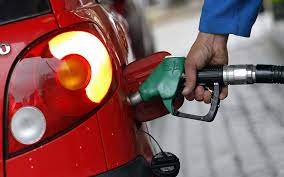By Jeph Ajobaju, Chief Copy Editor
Abuja spent N541 billion on fuel subsidy between February and July, and the funding will continue till 2022, despite argument by ministers and experts that it encourages petrol smuggling and benefits only the rich.
Nigerian National Petroleum Corporation (NNPC) Group Managing Director, Mele Kyari, recently announced that the corporation pays between N100 billion and N120 billion monthly to keep fuel pump price at N162 per litre.
He acknowledged that the 60 million litres reportedly used daily is far above local consumption but the NNPC is constrained by smuggling to neighbouring countries where fuel costs higher, per reporting by The Guardian (Nigeria).
Kyari said the NNPC keeps importing refined petroleum products to avert scarcity. But he told lawmakers in Abuja on Thursday that subsidy will end in 2022 if the conditions play out well.
Figures the NNPC presented to the Federation Account Allocation Committee (FAAC) meeting in February showed the sums the NNPC spent on fuel subsidy as
· February – N25.37 billion
· March – N60.39 billion
· April – N61.97 billion
· May – N126.33 billion
· June – N164.33 billion
· July – N103.28 billion
Quoting the figures, The Nation reports that the huge cost of subsidy depletes remittance by the NNPC to the Federation Account for distribution among the three tiers of government.
Independent importers driven out of market
Other oil marketers have quit importation of fuel products because of high exchange rate, leaving the NNPC as sole importer.
The NNPC claimed that fuel subsidy payment prevented it from making any remittance to the Federation Account in May. It reduced remittance by N126 in June, N114 billion (July), and N170 billion (August).
According to its data, the NNPC remitted N349 billion to the Federation Account between January and August, a N1.1 trillion shortfall of the sum meant to be shared among federal, states, and councils.
The remittance was made as follows:
· January – N90 billion
· February – N64 billion
· March – N41 billion
· April – zero
· May – N38 billion
· June – N47 billion
· July – N67 billion
Fuel subsidy continues, despite PIA
Muhammadu Buhari signing the Petroleum Industry Bill (PIB) into law does not remove fuel subsidy, says Minister of State for Petroleum Resources, Timipre Sylva, contradicting his earlier statement that subsidy would end once the bill became law.
The PIB was in the works for decades until Buhari signed it into law on August 23 and became the Petroleum Industry Act (PIA).
Sylva himself and Finance Minister Zainab Ahmed both have argued that subsidising petroleum products wastes funds. Sylva says it encourages fuel smuggling to neighbouring countries. Ahmed says its benefits the rich, not the poor.
But Sylva clarified through a text message his Media Adviser Garba Muhammad sent to The Nation on August 17 that “we’ll engage you (reporters) on this at the appropriate time” when asked about subsidy removal.
And Major Oil Marketers Association of Nigeria (MOMAN) Executive Secretary, Clement Isong insisted to The Nation that “no minister will provide transitional regulations leading to removal of subsidies now.”
Fuel subsidy remains till 2022
Per The Guardian, Kyari explained in Abuja on September 2 that fuel subsidy will remain till 2022 but the phasing out will be determined by the outcome of negotiations between the government and Labour
He made the point at the hearing organised by the Senate Joint Committees on Finance, National Planning, Foreign and Local Debts, Banking, Insurance and other financial institutions and Petroleum Resources on the 2022-2024 Medium Term Expenditure Framework (MTEF) and Fiscal Strategy Paper (MTEF-FSP).
Kyari acknowledged that fuel price hike will adversely affect citizens and national security but stressed that subsidy will end when the Petroleum Industry Act (PIA) becomes fully operational.













